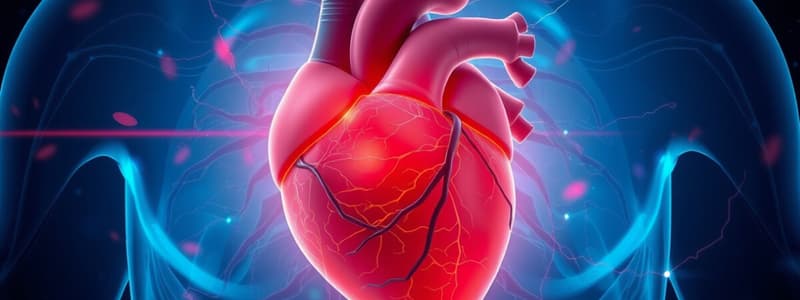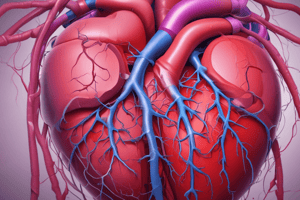Podcast
Questions and Answers
Which agent has been demonstrated to reduce mortality in patients with congestive heart failure?
Which agent has been demonstrated to reduce mortality in patients with congestive heart failure?
- Procainamide
- Furosemide
- Enalapril (correct)
- Digitalis
What is a recognized side effect of furosemide in the treatment of congestive heart failure?
What is a recognized side effect of furosemide in the treatment of congestive heart failure?
- Hypokalaemia
- Haemolytic anaemia (correct)
- Bronchospasm
- Hypoglycaemia
In a patient with regular narrow complex tachycardia, under which condition should the dose of adenosine be reduced?
In a patient with regular narrow complex tachycardia, under which condition should the dose of adenosine be reduced?
- Significant mitral regurgitation
- Theophylline use
- Chronic renal impairment
- Dipyridamole use (correct)
Which drug used for chronic heart failure has been associated with increased survival?
Which drug used for chronic heart failure has been associated with increased survival?
What is the most likely diagnosis for a patient with a systolic murmur and splenomegaly after a dental procedure?
What is the most likely diagnosis for a patient with a systolic murmur and splenomegaly after a dental procedure?
What type of angina is characterized by chest pain that occurs at rest and lasts longer than previously experienced?
What type of angina is characterized by chest pain that occurs at rest and lasts longer than previously experienced?
Which symptom is most closely associated with digoxin toxicity?
Which symptom is most closely associated with digoxin toxicity?
For a hemodynamically stable patient undergoing treatment for narrow complex tachycardia, which condition does not require a dose adjustment of adenosine?
For a hemodynamically stable patient undergoing treatment for narrow complex tachycardia, which condition does not require a dose adjustment of adenosine?
What is the most appropriate medication for a patient with a dilated left ventricular chamber and an ejection fraction of 30%?
What is the most appropriate medication for a patient with a dilated left ventricular chamber and an ejection fraction of 30%?
Which vitamin supplement is essential for a patient on isoniazid therapy to prevent neuropathy?
Which vitamin supplement is essential for a patient on isoniazid therapy to prevent neuropathy?
What is the likely reason for elevated TSH levels in a patient receiving increased thyroxine?
What is the likely reason for elevated TSH levels in a patient receiving increased thyroxine?
What might be the cause of intense flushing after taking a newly prescribed lipid-lowering drug?
What might be the cause of intense flushing after taking a newly prescribed lipid-lowering drug?
In the management of hypertension, which medication was recommended after a drug change due to side effects?
In the management of hypertension, which medication was recommended after a drug change due to side effects?
What is the most likely diagnosis for a patient presenting with an ankle-brachial index of 0.80?
What is the most likely diagnosis for a patient presenting with an ankle-brachial index of 0.80?
Which condition must be excluded before allowing a 15-year-old boy to participate in sports given his family history of sudden cardiac death?
Which condition must be excluded before allowing a 15-year-old boy to participate in sports given his family history of sudden cardiac death?
What is the most likely diagnosis for a 55-year-old diabetic patient experiencing bilateral intermittent leg pain relieved by rest?
What is the most likely diagnosis for a 55-year-old diabetic patient experiencing bilateral intermittent leg pain relieved by rest?
In a patient with left-sided hemiparesis and confirmed brain infarction, what is the best management option?
In a patient with left-sided hemiparesis and confirmed brain infarction, what is the best management option?
Given a patient with bilateral leg deep vein thrombosis and prolonged APTT, what is the most likely diagnosis?
Given a patient with bilateral leg deep vein thrombosis and prolonged APTT, what is the most likely diagnosis?
What is the most likely diagnosis for an 81-year-old diabetic presenting with a cold lower extremity and diminished pedal pulses?
What is the most likely diagnosis for an 81-year-old diabetic presenting with a cold lower extremity and diminished pedal pulses?
What underlying condition should be considered in a 70-year-old man with acute confusional state, postural hypotension, and dry mucous membranes?
What underlying condition should be considered in a 70-year-old man with acute confusional state, postural hypotension, and dry mucous membranes?
In a scenario where a diabetic patient's leg pain worsens in a dependent position, what is the most likely diagnosis?
In a scenario where a diabetic patient's leg pain worsens in a dependent position, what is the most likely diagnosis?
What is the most appropriate management modification for a patient with hypertension currently treated with hydrochlorothiazide?
What is the most appropriate management modification for a patient with hypertension currently treated with hydrochlorothiazide?
What is the most likely diagnosis for a patient presenting with fever, night sweats, and painless erythematous lesions on the palms?
What is the most likely diagnosis for a patient presenting with fever, night sweats, and painless erythematous lesions on the palms?
In a 77-year-old woman with dizziness when standing up, what is the most likely explanation for her symptoms?
In a 77-year-old woman with dizziness when standing up, what is the most likely explanation for her symptoms?
What is the most appropriate next step in management for a patient with confusion and low blood pressure due to acute illness?
What is the most appropriate next step in management for a patient with confusion and low blood pressure due to acute illness?
Which abnormal lab result would indicate a potential complication in a patient with poorly controlled diabetes?
Which abnormal lab result would indicate a potential complication in a patient with poorly controlled diabetes?
What physical examination finding is a common indicator of bacterial endocarditis?
What physical examination finding is a common indicator of bacterial endocarditis?
In assessing a 67-year-old man with confusion and tachycardia, which of the following is the most likely vital sign abnormality?
In assessing a 67-year-old man with confusion and tachycardia, which of the following is the most likely vital sign abnormality?
What class of medications is commonly contraindicated in patients with autonomic neuropathy?
What class of medications is commonly contraindicated in patients with autonomic neuropathy?
Based on the symptoms experienced in the Emergency Department, what is the most likely diagnosis?
Based on the symptoms experienced in the Emergency Department, what is the most likely diagnosis?
After the initial management in the Emergency Department for the 65-year-old woman, what is the most appropriate treatment?
After the initial management in the Emergency Department for the 65-year-old woman, what is the most appropriate treatment?
For the 75-year-old man with atrial fibrillation and a previous transient ischemic attack, what is the most appropriate management plan?
For the 75-year-old man with atrial fibrillation and a previous transient ischemic attack, what is the most appropriate management plan?
What is the most likely diagnosis for the 29-year-old woman with shortness of breath after giving birth?
What is the most likely diagnosis for the 29-year-old woman with shortness of breath after giving birth?
What is the most likely cause of sudden dyspnoea and a new harsh systolic murmur in a man 6 days after a myocardial infarction?
What is the most likely cause of sudden dyspnoea and a new harsh systolic murmur in a man 6 days after a myocardial infarction?
What ECG finding is typically associated with unstable angina?
What ECG finding is typically associated with unstable angina?
Which symptom is least likely to be associated with peripartum cardiomyopathy?
Which symptom is least likely to be associated with peripartum cardiomyopathy?
Which treatment option is inappropriate for a patient with myocardial infarction?
Which treatment option is inappropriate for a patient with myocardial infarction?
Flashcards are hidden until you start studying
Study Notes
Congestive Heart Failure
- Furosemide is identified as an agent that reduces mortality in patients with congestive heart failure.
- Recognized side effect of furosemide: haemolytic anaemia.
- Enalapril has been shown to increase survival in chronic heart failure treatment.
Digoxin Toxicity
- Symptoms: vomiting, abdominal pain, yellow-tinged vision.
- Most likely diagnosis in a 40-year-old woman presenting with these symptoms is digoxin toxicity.
Regular Narrow Complex Tachycardia
- In hemodynamically stable patients receiving IV adenosine, dosage should be reduced in the presence of dipyridamole.
Bacterial Endocarditis
- Most likely diagnosis for a 39-year-old man presenting with fever, splenomegaly, and elevated WBC is bacterial endocarditis.
- Symptoms and findings suggest infective endocarditis associated with recent dental procedures.
Angina Types
- Unstable angina is characterized by worsening chest pain, occurring at rest or with minimal exertion.
Hypertension Management
- In a 52-year-old man with poorly controlled hypertension on hydrochlorothiazide, adding an angiotensin-converting enzyme (ACE) inhibitor is the most appropriate management modification.
Infective Endocarditis Indicators
- An intravenous drug user with symptoms of fever, night sweats, and retinal findings is suggested to have bacterial endocarditis.
Autonomic Neuropathy
- A 77-year-old woman showing orthostatic dizziness is likely experiencing symptoms due to autonomic neuropathy rather than medication side effects or hypoglycemia.
Diagnostic Management
- In a case of suspected unstable angina, IV boluses of normal saline should be the immediate management step.
Acute Limb Ischemia
- Diagnosis for a patient with cold, red, and diminished pulses in the leg is likely arterial insufficiency.
Cardiac Event Management
- A patient showing ST segment depression may present with unstable angina, requiring appropriate management.
Thrombolytic Therapy
- Primary coronary artery stenting is indicated for a patient presenting with rapid onset shortness of breath and arm pain.
Atrial Fibrillation Management
- For an asymptomatic 75-year-old man with atrial fibrillation, starting anticoagulation therapy is crucial to prevent stroke.
Peripartum Cardiomyopathy
- A postpartum woman exhibiting difficulty breathing and a displaced apex beat is likely suffering from peripartum cardiomyopathy.
Myocardial Complications
- A patient post-myocardial infarction with dyspnea and new heart murmur may be developing functional mitral regurgitation.
Medication and Neuropathy
- Pyridoxine administration is recommended for a patient on isoniazid to prevent neuropathy.
Hypothyroidism and Lab Results
- Poor medication adherence in a 30-year-old woman is suggested by lab results that indicate mismanaged thyroid levels.
Lipid Management Reaction
- Faced with intense flushing from a prescribed lipid medication, patient relief was achieved by converting to a higher dose of aspirin rather than the initially prescribed lower dose.
Studying That Suits You
Use AI to generate personalized quizzes and flashcards to suit your learning preferences.




